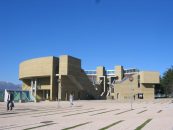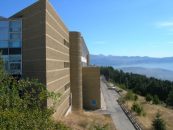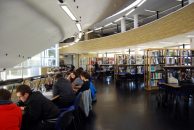Dept. of Civil, Construction-Architectural & Environmental Engineering

Dept. of Civil, Construction-Architectural & Environmental Engineering
Piazzale Pontieri, 1
67100 L'Aquila, Monteluco di Roio
IT
N 42° 21' 5.02'', E 42° 21' 5.02''
http://diceaa.univaq.it/en
Master: ITA, ITA - ENG
Bachelor: ITA
The Department of Civil, Construction-Architectural and Environmental Engineering (hereinafter referred to as its Italian acronym “DICEAA”) aims to group researchers bound together by scientific interests within the frame of Civil, Construction-Architectural and Environmental Engineering and previously belonging to the former Structural, Hydraulic and Soil Engineering Department and Urban planning and Architecture Department of the University of L’Aquila. The DICEAA is involved in the research, development as well as teaching of the sciences related to Civil, Environmental and Construction-Architectural Engineering.
DICEAA carries out its activities also by means of its 11 laboratories and two Research Centers, CERFIS and M&MOCS.
The Department of Civil, Construction-Architectural, Environmental Engineering is formed by 8 first level and 21 second level professors, 12 researcher and it is divided in several research sectors according Civil Engineering and Architecture area (Building Science, Building Techiques, Hydraulics, Hidraulic and Maritime Constructions, Topography and Cartography, Geotechinical, Applied Geology, Ecology, Environmental Physics, Science and Technology of Materials, Design, Architectural Techique, Urban and Architectural Planning, History of Architecture, Urban Technique and Planning, Construction of Roads Railways and Airports, Transportations).
Together the activity of the department there are also two centers of excellence and two research centers with interdepartmental activities:
• Research and Formation Center for Seismic Engineering (Centro di Ricerca e Formazione per l’Ingegneria Sismica, CERFIS, http://www.cerfis.it/), with administrative with headquarters in DICEAA;
• International Center for Research on Mathematics and Complex Systems Mechanics (Centro internazionale di ricerca per la Matematica e la Meccanica dei Sistemi Complessi, M&MOCS, http://memocs.univaq.it), with headquarters in DICEAA
- Libraries
- Dining Hall
- Student residences
- Gym
- Public Transportation
http://www.univaq.it/en/section.php?id=911
http://www.adsuaq.org/residenze.php
All students with a school leaving qualification (e.g. high school diploma) can apply to study at DICEAA in L'Aquila. Admission to Italian Universities is regulated by the Ministry of Foreign Affairs of Italy (MAE) and by the Ministry of Education, University and Research (MIUR).
For applying to master degree in Construction-Architectural Engineering all students must pass a national test, before the beginning of classes.
The students of the first year of bachelor degree must take the CISIA test, not selective.
http://www.univaq.it/section.php?id=55
Every year the Ministry of Foreign Affairs of Italy and the Ministry of Education, University and Research publish the deadlines for applications at the end of May.
The PhD program Ph.D.ICEAA aims to improve the quality of the scientific research in the field of Civil and Environmental Engineering and in Architecture and Construction Engineering. The common target is the training of PhDs able to develop researches and tackle specific professional problems. The two curricula (Civil Engineering and Architecture) present different programs according to the specific educations from the masters.
The Civil and Environmental Engineering program offers original and innovative researches on the criteria and methodologies for the correct management and protection of the built and natural heritage. Relating to the spread seismic and hydrogeological vulnerability, the PhD program aims to develop researches and strategies for the whole territory protection, relating not only to the local areas.
The Construction Engineering and Architecture program supports high level of researches in all the fields of architecture, as technology, survey, conservation and urbanism. The use of multidisciplinary/interdisciplinary approaches let the PhD researches proposing complex solutions for the articulated framework of the reconstruction processes of the territory and the built heritage.
Master, Construction-Architectural Engineering, 5 years, Eng. - Arch., ITA, 300,
http://www.ing.univaq.it/cdl/mostra_corso.php?codice=I4A
Within the frame of Construction-Architectural Engineering, DICEAA is involved in the urban and rural planning, design, sketch, survey and urban and architectural renovation as well as the recovery of built and preservation and valorization of cultural and environmental heritage, environmental protection, site organization, land and urban valuations, laws regarding buildings and urban planning, history of architecture, of towns and building technologies, technological installations in buildings, geomatics, mobility infrastructures and transportation.
Master, Civil Engineering, 2 years, Eng., ITA - ENG, 120,
http://www.ing.univaq.it/cdl/mostra_corso.php?codice=I4C
Within the frame of Civil Engineering, DICEAA carries out its activities with regards to design, construction, maintenance, safety and monitoring of structures (i.e. civil structures, hydraulic and maritime structures, embankments and foundations, roads, bridges, railways, harbors, airports, etc..) with particular attention paid to the design and seismic upgrading of existing building and monumental heritage. Typical tools used by DICEAA to reach its goals are mathematical and physical modeling aimed to describe the mechanical and dynamic behavior of materials, structures, soil and water and of their mutual interactions.
Master, Environmental Engineering, 2 years, Eng., ITA, 120,
http://www.ing.univaq.it/cdl/mostra_corso.php?codice=I4R
Within the frame of Environmental Engineering, DICEAA is involved in the design, construction and maintenance of civil structures aimed to increase the public health and to protect landscape and coasts as well as to limit environmental risks. Moreover, DICEAA is involved in the study, the survey and physical, chemical, geological, geomorphologic and biological monitoring of environmental parameters, including their statistical analyses; in the development of novel geomatics techniques and mathematical modeling aimed to assess the environmental risk related to civil engineering projects; in the development of early warning systems, including tsunamis; in the activities to be carried out within the integrated coastal zone and environment management; in the integrated depuration and treatment of waste water and solids; in the reclamation of polluted areas including marine sediments.
Bachelor, Civil and Environmentale Engineering, 3 years, Eng., ITA, 180,
http://www.ing.univaq.it/cdl/mostra_corso.php?codice=I3A
Bachelor Degree in Civil and Envinromental Engineering
http://diceaa.univaq.it/en/civil-construction-architectural-and-environmental-engineering-department-2/
http://www.ing.univaq.it/studenti/guide/2020-2021/Guida_Ingegneria_2020-21.pdf?time=36
The bachelor degree in Civil and Environmental Engineering aims to form technicians with an accademic education, able to accept and follow innovation, according the scientific and technological development. It aims, so, to give a good base education, a large engineering support and a professional competence which, according to the knowledge of technique and base instruments, give solutions to engineering problems about civil and environmental design. The integrated approach is focus on solid and structures mechanics, hydraulics, hydrology, geotehnics and survey and monitoring of structures and infrastructure (Civil orientation) and environment defence, eco-compatible management of natural and anthropical resources, sustainability use of the territory, prevention and control of pollution phenomena (Environmental orientation).
The Master’s Degree in Construction Engineering-Architecture aims to create a professional figures able to manage all the processes related to the field of new constructions, built heritage and urban planning with the specific skills of a complete knowledge. The master’s targets refer also to the constructive feasibility of the designed work, up to being able to competently follow the correct execution under the aesthetic, functional and technical – economic profile. Therefore, an integration in a qualitative sense of the historical – critical training with the scientific one is implemented, according to a didactic approach that conceives design as a process of synthesis, to give this professional figure full title to operate, also at European level, in the field of architectural and urban planning.
The Master’s Degree in Civil Engineering aims to train technicians with high-level of preparation, with skills suitable for designing and managing complex activities. Relating to the design and development of scientific and technological innovation, the master aims also to the promotion of research in a wide technical-scientific sector.
The Master’s Degree in Environmental Engineering aims to train technicians with high-level of preparation relating to the pollution of the air, water and soil matrices, with particular attention to the identification of sources of pollution and transport processes, technologies aimed at preserving public health.
The PhD program aims to improve the quality of the scientific research in the field of Civil and Environmental Engineering and in Architecture and Construction Engineering. The common target is the training of PhDs able to develop researches and tackle specific professional problems. The two curricula (Civil Engineering and Architecture) present different programs according to the specific educations from the masters.
The Civil and Environmental Engineering program offers original and innovative researches on the criteria and methodologies for the correct management and protection of the built and natural heritage. Relating to the spread seismic and hydrogeological vulnerability, the PhD program aims to develop researches and strategies for the whole territory protection, relating not only to the local areas.
The Construction Engineering and Architecture program supports high level of researches in all the fields of architecture, as technology, survey, conservation and urbanism. The use of multidisciplinary/interdisciplinary approaches let the PhD researches proposing complex solutions for the articulated framework of the reconstruction processes of the territory and the built heritage.
http://diceaa.univaq.it/phdiceaa/
http://diceaa.univaq.it/en/laboratory-and-research/









